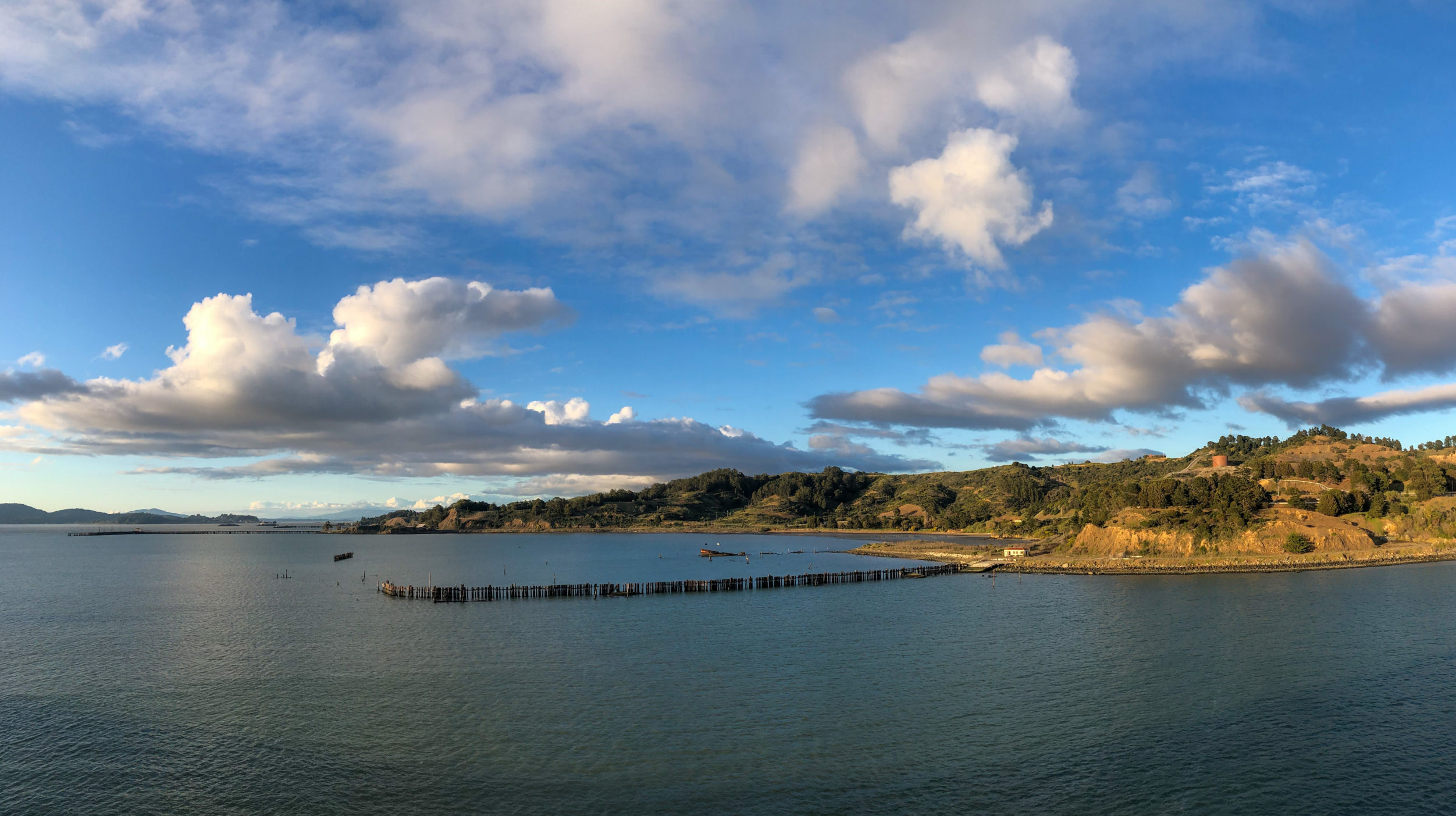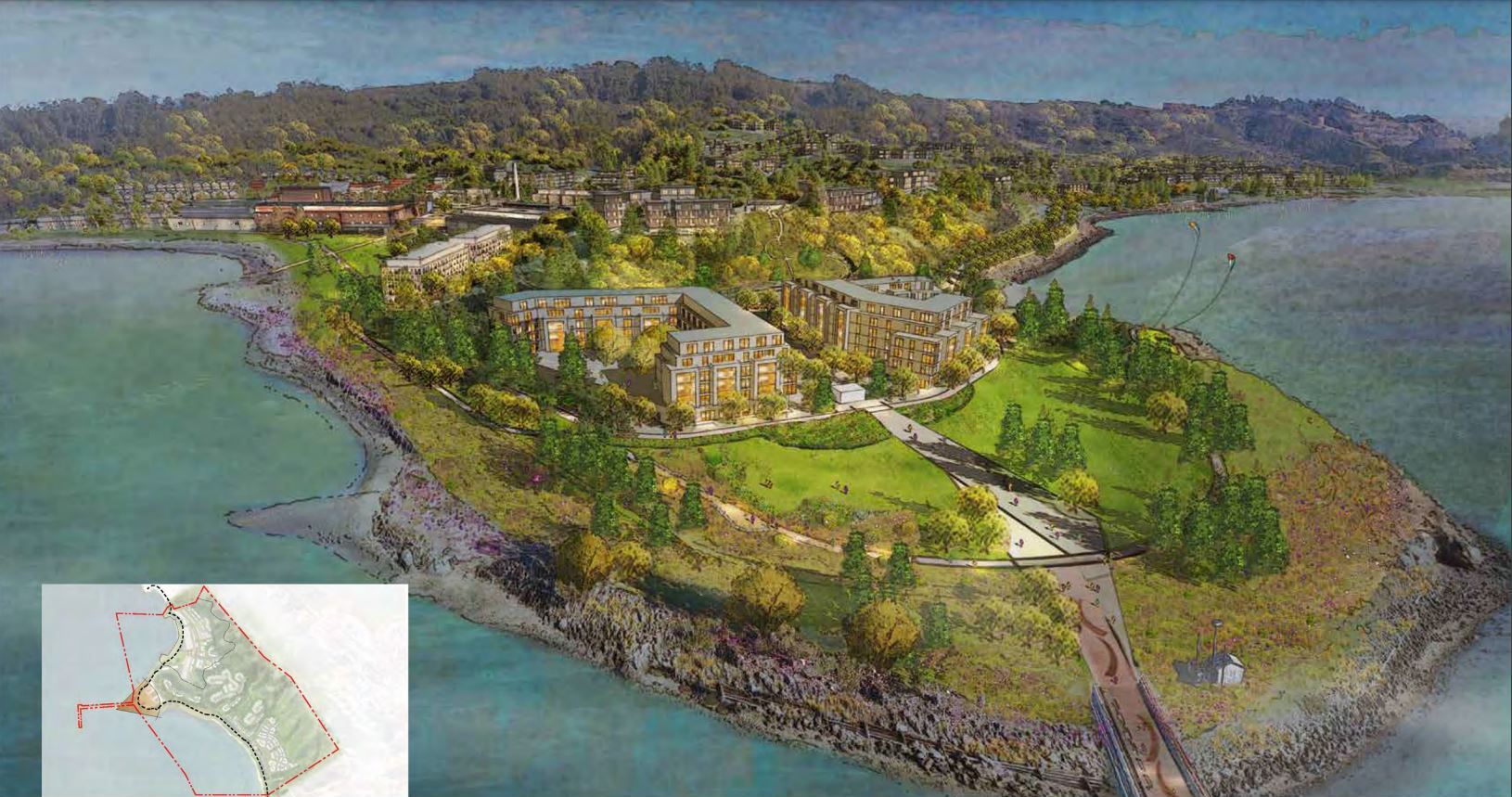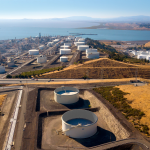
View of Point Molate from the Richmond-San Rafael Bridge. -Jack Scheinman
Update: The public hearing for the future of Point Molate has been postponed from November 2021 to spring of 2022.
Nearly 25 years ago, the U.S. Navy transferred more than 400 acres on Point Molate to the City of Richmond. People have been fighting over them ever since. A core point of contention is whether or not to build housing on part of this headland, which includes one of the few undeveloped shorelines in the East Bay. Where the city envisions a mix of housing, a shoreline park, and hillside trails, opponents envision a regional park all the way from the sandy beach to the 400-foot bluffs.
Now the general public can weigh in on this longstanding controversy. The Bay Conservation and Development Commission, which regulates shoreline use in the San Francisco Bay, is scheduled to hold a public hearing on the future of Point Molate in spring of 2022.
The Point Molate saga dates to the mid-1990s, when the Navy decommissioned a fuel depot that had been there since 1942. Richmond mayor Tom Butt has been there since the beginning of the debate over how to repurpose this land. “The land transfer was one of my first votes,” recalls Butt, who has served on the Richmond City Council since 1995.
Next the Navy gave the city $28 million to clean up the fuel-contaminated soil, and the city appointed a 45-member blue ribbon committee of Richmond citizens that came up with a reuse plan for the site that included housing. Then came years of lawsuits — brought by environmental groups and by the city — some of which are still pending. “It’s been a long and tortured path,” says Butt. “It’s very complicated, very screwed up, and very political.”
In 2020 the Richmond City Council approved their current plan for Point Molate, which includes 1,260 housing units flanked by a shoreline park with 1.5-miles of the Bay Trail and by hillside open space with trails. Most of the housing is multi-family and multi-story, and 67 units will be affordable while others will be priced below market so firefighters and teachers can buy them. The beach park and hillside trails are public access.
Butt likens the city’s Point Molate plan to the redevelopment on Treasure and Yerba Buena islands, which the Navy is transferring to the City of San Francisco. The islands, which total about 650 acres, are slated for up to 8,000 homes set in parks and open space.

Drawing of the proposed Point Molate development. -Hart Howerton
Jack Scheinman, who has worked in Richmond at the Rubicon Bakery for two decades, worries that development would destroy what he treasures about Point Molate. Scheinman walks his dog there along the shore several times a week, bringing his camera to capture the headland’s abundant wildlife, from deer and coyotes to bald eagles and nesting osprey. He shares his images on “Pt Molate 4 All,” a Facebook page he founded. “I just love it here,” Scheinman says. “It’s a perfect place in the Bay Area — I would hate to see this go away.”
Scheinman is also part of the Point Molate Alliance, which includes environmental and social justice groups. The Alliance has its own vision for the land bordering the beach park, which slopes inland. “We are proposing the entire hillside be part of the park,” says Alliance co-chair Andres Soto, a former Richmond planning commissioner.
The Alliance wants a regional park that includes picnic areas for families, which Soto says are greatly needed. “Latino families live in older parts of town with small yards so there’s not much room for entertaining,” explains Soto, who is the Richmond organizer for Communities for a Better Environment, an environmental justice and sustainability nonprofit. “At Miller/Knox park on the weekends, people arrive at 6 am to get spots.” Miller/Knox Regional Shoreline is on Point Richmond, which is just south of Point Molate.
In addition, the Alliance hopes to restore habitat on the uplands above Point Molate’s beach park. “It’s undeveloped but not pristine,” Soto says. “There are old tanks and invasive plants.”
Soto knows Richmond needs more housing. He just doesn’t want it on Point Molate. “We don’t need housing there,” he says. “The old downtown is ripe for redevelopment — many buildings there have been vacant since the 1970s, when Hilltop Mall was built.”
Downtown Richmond is perfect for housing, agrees Matt Regan, housing policy lead for the Bay Area Council, a business-backed nonprofit. But he thinks Point Molate is too. “We should build housing at the Richmond BART and at Point Molate,” he says. “It’s not an either-or.”
The regional housing crisis stems from the lack of housing at all affordability levels — market-rate as well as affordable units — according to Plan Bay Area, a government-led effort to guide the region’s future. Regan explains it like this: when the supply of market-rate units is limited, wealthier people drive up housing prices at the expense of those who are less affluent. “If we don’t build for people with means, they’ll take housing from others and displace them,” he says. “That leads to gentrification.”
In the worst case, the displaced people become homeless. A growing number of others move to the Central Valley while keeping their jobs in the Bay Area. “Close to 180,000 people drive here from Tracy and Stockton every day,” Regan says, adding that many are low-income people of color. “We’ve exported our housing to auto-dependent suburbs.”
Not only does this entail two-hour commutes each way, but more driving means more carbon emissions. “The Bay Area’s housing crisis is associated with environmental and social equity crises,” he says. “Point Molate is close to jobs.”
The Bay Conservation and Development Commission (BCDC) currently designates 276 acres of Point Molate as waterfront park. The developer seeking to build the City of Richmond-approved project on Point Molate has asked to remove 83 of those acres. Oral comments on this proposal may be presented at the public hearing at 1:00 pm on November 4 at 375 Beale Street in San Francisco. Written comments may be submitted on or before November 4.
For more information, see the BCDC staff report on the Point Molate development proposal.

